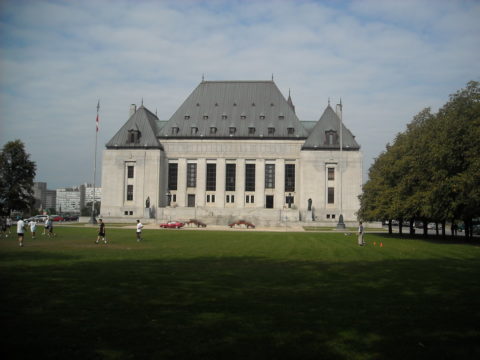In Wednesday’s NP Platformed newsletter, Colby Cosh suggests that, given the SCC’s demonstrated preference for getting rid of restrictions on voting rights, we may be in for some interesting legal times:

“Supreme Court of Canada, Ottawa” by daniel0685 is licensed under CC BY 2.0
A band of plucky teens, we are told, are suing to have Canada’s voting age lowered. They are not the first to try, and it goes without saying that the youngsters are a front for a gaggle of do-gooder groups who think that it would somehow purify our democracy in the fires of justice if 16-year-olds could vote. NP Platformed thinks this is a terrible idea that has logical problems on its face. If the age-18 voting limitation can’t be defended, how can any such limit be defended?
Rest assured that the grown-up lobbyists who have a sore bum about the voting age won’t be recruiting four-year-old boys to articulate their cause or serve as litigants. It will all be photogenic, politically sophisticated, fantastically unrepresentative teenagers.
But let’s set the snark aside for a moment. You may be asking, as we here at NP Platformed world headquarters did, how a charter challenge to the voting age can happen at all. Surely there’s solid caselaw about this? If you look into the matter, as we did, you might find yourself saying “Uh oh.” As we did.
The most revealing discussion we could find is tucked away in a footnote in a 2019 paper by University of Ottawa Prof. Michael Pal. Within this wad of small print, Prof. Pal outlines the whole issue. The charter says flat out that “Every citizen of Canada” has the right to vote in elections, and various species of legal voting disability have been removed over time, leaving persons under 18 as the only citizens within Canada who cannot exercise this right.
[…]
“The analogy between youth voting restrictions and inmate disenfranchisement breaks down because the type of judgment Parliament is making in the two scenarios is very different. In the first case, Parliament is making a decision based on the experiential situation of all citizens when they are young. It is not saying that the excluded class is unworthy to vote, but regulating a modality of the universal franchise. In the second case, the government is making a decision that some people, whatever their abilities, are not morally worthy to vote — that they do not ‘deserve’ to be considered members of the community and hence may be deprived of the most basic of their constitutional rights. But this is not the lawmakers’ decision to make.”
We’re just gonna say it: “regulating a modality of the universal franchise” is drivel. If this is the bedrock on which age restrictions on voting rest, age restrictions on voting are in trouble.
The constitutionality of a voting age was also discussed in the Supreme Court’s 2019 Frank case, which annihilated the voting eligibility restrictions for Canadian citizens living abroad. In that case it was dissenters, specifically justices Suzanne Côté and Russell Brown, who brought the matter up. If legislatures can’t restrict the voting rights of Canadians who have been living in Cucamonga or Timbuktu, how can they impose any limit at all?
The dissenting pair quietly pointed out (at paragraph 144) that the phrase “regulating a modality” is gaseous nonsense, and that the Supreme Court, in its endless lust for making the franchise more inclusive, seems to have made any restrictions at all untenable. (Why, indeed, should the franchise be limited to citizens? Municipalities are already asking this question!)



